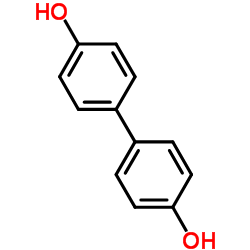4,4'-Dihydroxybiphenyl

4,4'-Dihydroxybiphenyl structure
|
Common Name | 4,4'-Dihydroxybiphenyl | ||
|---|---|---|---|---|
| CAS Number | 92-88-6 | Molecular Weight | 186.21 | |
| Density | 1.2±0.1 g/cm3 | Boiling Point | 355.2±17.0 °C at 760 mmHg | |
| Molecular Formula | C12H10O2 | Melting Point | 280-282 °C(lit.) | |
| MSDS | Chinese USA | Flash Point | 176.1±15.5 °C | |
| Symbol |

GHS07 |
Signal Word | Warning | |
|
Bisphenol A binds to Ras proteins and competes with guanine nucleotide exchange: implications for GTPase-selective antagonists.
J. Med. Chem. 56(23) , 9664-72, (2013) We show for the first time that bisphenol A (10) has the capacity to interact directly with K-Ras and that Rheb weakly binds to bisphenol A (10) and 4,4'-biphenol derivatives. We have characterized these interactions at atomic resolution suggesting that these... |
|
|
Detection of bioactive exometabolites produced by the filamentous marine cyanobacterium Geitlerinema sp.
Mar. Biotechnol. 14(4) , 436-45, (2012) Marine cyanobacteria are noted for their ability to excrete metabolites with biotic properties. This paper focuses on such exometabolites obtained from the culture of the marine filamentous cyanobacterium Geitlerinema sp. strain, their purification and subseq... |
|
|
Effects of the environmental oestrogens bisphenol A, tetrachlorobisphenol A, tetrabromobisphenol A, 4-hydroxybiphenyl and 4,4'-dihydroxybiphenyl on oestrogen receptor binding, cell proliferation and regulation of oestrogen sensitive proteins in the human breast cancer cell line MCF-7.
Pharmacol. Toxicol. 92(4) , 180-8, (2003) Bisphenol A is extensively used in the manufacturing of epoxy resins and polycarbonate plastics, whereas several brominated and chlorinated analogues are used as flame retardants and intermediates in the plastic industry. Due to the structural relationship be... |
|
|
Occupational dermatitis to dihydroxydiphenyl and diphenylthiourea in neoprene gloves.
Contact Dermatitis 16(5) , 290-1, (1987)
|
|
|
Antioxidant and cyclooxygenase-2-inhibiting activity of 4,4'-biphenol, 2,2'-biphenol and phenol.
Anticancer Res. 29(6) , 2403-10, (2009) The anthropogenic substance 4,4'-biphenol and its analogues are estrogenic and cytotoxic. It has been previously found that synthesized ortho-dimers of phenolic compounds possess potent antioxidative and anti-inflammatory activity. To clarify the relationship... |
|
|
Kinetic evaluation of reactivity of bisphenol A derivatives as radical scavengers for methacrylate polymerization.
Biomaterials 21(21) , 2125-30, (2000) The reactivity of bisphenol A (BPA), diethylstilbestrol (DEST) 2,2'-biphenol (22'BP), 4,4'-biphenol (44'BP) and hydroquinone (HQ) as radical scavengers was examined in 2,2'-azobisisobutyronitrile (AIBN)- and benzoyl peroxide (BPO)-induced methyl methacrylate ... |
|
|
Angew. Chem. Int. Ed. Engl. 106 , 1563, (1994)
|
|
|
Self-assembly and host-guest chemistry of a 3.5-nm coordination nanotube.
Chem. Asian J. 2(4) , 468-76, (2007) Upon complexation with Pd(II) ions, precisely designed strandlike ligands with two tris(3,5-pyridine) units at both terminals were assembled, with the aid of a linear template molecule, into a discrete tubular complex with a length of 3.5 nm. The high stabili... |
|
|
Hydroxylations of biphenyl by fungi.
J. Appl. Bacteriol. 49(1) , 65-73, (1980)
|
|
|
Constituents of Agaricus xanthodermus Genevier: the first naturally endogenous azo compound and toxic phenolic metabolites.
Z. Naturforsch., C, J. Biosci. 39(11-12) , 1027-9, (1984) Extraction of fresh sporophores of the fungus Agaricus xanthodermus yields 4,4'-dihydroxy-azobenzene, phenol, p-quinol, and 4,4'-dihydroxybiphenyl. This is the first report of an azo compound arising endogenously in nature, while phenol, p-quinol and 4,4'-dih... |